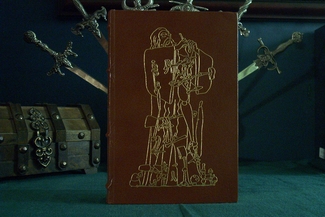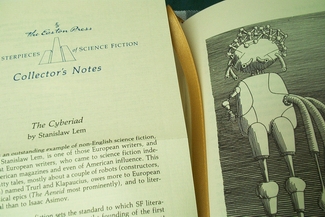Easton Press Stanislaw Lem books
Solaris - Masterpieces of Science Fiction - 1987
The Cyberiad - Masterpieces of Science Fiction - 1990
Stanislaw Lem biography
Stanisław Lem, born on September 12, 1921, in Lwów, Poland (now Lviv, Ukraine), was a renowned Polish writer, philosopher, and futurologist, celebrated for his pioneering contributions to science fiction literature. Throughout his prolific career, Lem produced a vast body of work that explored complex philosophical and scientific themes, earning him international acclaim and recognition as one of the greatest science fiction writers of the 20th century. Lem's early life was shaped by the tumultuous events of World War II and its aftermath. He studied medicine at the Lviv University before the outbreak of the war forced him to abandon his studies. During the war, Lem worked in various menial jobs to survive, all while secretly pursuing his passion for writing.
In the years following the war, Lem completed his medical studies at the Jagiellonian University in Kraków, Poland, and began his writing career in earnest. He initially gained attention for his short stories and essays, which explored themes of technology, artificial intelligence, and the nature of consciousness. Lem's breakthrough came with the publication of his first major novel, The Astronauts (also known as The Man from Mars), in 1951. The novel, set in a dystopian future where humanity has colonized Mars, established Lem as a visionary writer with a keen interest in exploring the implications of scientific progress and technological innovation.
Throughout the 1950s and 1960s, Lem continued to produce groundbreaking works of science fiction, including Solaris, arguably his most famous novel. Published in 1961, Solaris explores themes of alien contact, memory, and the limitations of human understanding, earning widespread acclaim for its philosophical depth and psychological insight. Lem's writing was characterized by its intellectual rigor, imaginative scope, and playful wit. He drew inspiration from a wide range of sources, including literature, philosophy, and science, to create thought-provoking narratives that challenged readers to reconsider their assumptions about the nature of reality and the human condition. In addition to his fiction writing, Lem was also a prolific essayist and critic, publishing numerous works on topics ranging from cybernetics and futurology to literary theory and aesthetics. He was known for his skepticism toward the utopian visions of technological progress and his exploration of the ethical dilemmas posed by advancements in science and technology.
Despite living under the repressive Communist regime in Poland for much of his life, Lem achieved international success and recognition for his writing. His works have been translated into multiple languages and adapted into films, radio plays, and television series, cementing his status as one of the most influential figures in science fiction literature. Stanisław Lem passed away on March 27, 2006, in Kraków, Poland, leaving behind a rich and enduring legacy as a visionary writer whose work continues to inspire and provoke thought in readers around the world.
Solaris
Solaris is a science fiction novel first published in 1961. It is considered one of the most influential works in the genre and has been adapted into multiple films and other media. The novel is set on a distant planet called Solaris, covered almost entirely by a mysterious and sentient ocean that exhibits inexplicable behavior. The story follows Kris Kelvin, a psychologist sent to a space station orbiting Solaris to investigate the strange occurrences reported by the station's crew.Upon his arrival, Kelvin discovers that the crew members are experiencing vivid hallucinations and encountering manifestations of their deepest fears and regrets. These manifestations are created by the ocean's ability to scan the minds of the station's inhabitants and materialize their innermost thoughts and desires. As Kelvin delves deeper into the mysteries of Solaris, he becomes entangled in his own psychological journey, confronting unresolved trauma and grappling with the nature of human consciousness and reality itself. The novel explores profound philosophical questions about identity, memory, and the limitations of human understanding.
Lem's writing in Solaris is characterized by its intricate world-building, thought-provoking ideas, and existential themes. Through the lens of speculative fiction, he examines the complexities of human relationships and the nature of intelligence, offering a poignant reflection on the human condition. Solaris has been praised for its originality, depth, and literary quality, earning it a place among the classics of science fiction literature. It continues to captivate readers with its exploration of the unknown and its timeless meditation on the mysteries of the universe and the human mind.
The Cyberiad
The Cyberiad is a collection of science fiction short stories originally published in 1965. This seminal work is celebrated for its imaginative storytelling, philosophical depth, and humorous tone, making it a standout in the realm of speculative fiction. Set in a distant future where technology has advanced to the point of near-magic, The Cyberiad follows the exploits of two brilliant constructor robots, Trurl and Klapaucius, as they embark on various adventures across the cosmos. Trurl and Klapaucius are masters of their craft, able to build and manipulate anything from sentient machines to entire universes with their extraordinary skills.Each story within The Cyberiad showcases Lem's inventiveness and wit, as Trurl and Klapaucius encounter a plethora of bizarre creatures, outlandish challenges, and ethical dilemmas. From constructing a machine that can solve any problem (with unintended consequences) to engaging in cosmic battles with tyrannical dictators, the duo's escapades are as entertaining as they are thought-provoking. At its core, The Cyberiad explores themes such as the nature of creativity, the limits of technology, and the ethical implications of scientific advancement. Through the lens of science fiction, Lem raises profound questions about the human condition and the relationship between creator and creation.
Lem's writing in The Cyberiad is marked by its playful language, clever wordplay, and keen observational humor. His stories are filled with colorful characters, imaginative settings, and intricate plot twists, captivating readers with their boundless imagination and intellectual depth. The Cyberiad" has earned widespread acclaim for its originality and literary merit, cementing Stanisław Lem's reputation as one of the foremost voices in science fiction literature. Its enduring popularity and influence continue to inspire readers and writers alike, reaffirming its status as a classic of the genre.




No comments:
Post a Comment
Share your best book review and recommendation